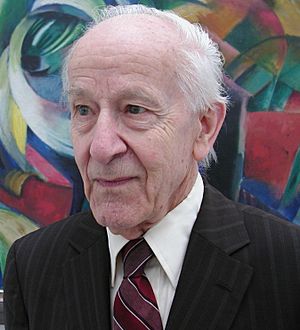Rolf Huisgen facts for kids
Quick facts for kids
Rolf Huisgen
|
|
|---|---|

Rolf Huisgen in 2004
|
|
| Born | 13 June 1920 Gerolstein, Rhineland-Palatinate, Germany
|
| Died | 26 March 2020 (aged 99) |
| Alma mater | University of Munich |
| Known for | 1,3-dipolar cycloaddition reaction |
| Awards | 1960 Centenary Prize 1961 Liebig Medal 1979 Otto Hahn Prize for Chemistry and Physics |
| Scientific career | |
| Fields | Chemist |
| Institutions | University of Munich |
| Doctoral advisor | Heinrich Otto Wieland |
Rolf Huisgen (born June 13, 1920 – died March 26, 2020) was an important German chemist. He made a huge impact on how chemistry was taught and studied in Germany and Austria after World War II. This was because many of his students became professors themselves. His most famous discovery was a special chemical reaction called the 1,3-dipolar cycloaddition. It's also known as the Huisgen cycloaddition.
Contents
Early Life and Education
Rolf Huisgen was born in a town called Gerolstein in Germany. He studied chemistry in Munich at the University of Munich. His teacher and mentor was a famous chemist named Heinrich Otto Wieland. In 1943, Rolf Huisgen earned his Ph.D. (a high-level university degree) for his work on a natural substance called a strychnine alkaloid.
After finishing his studies, he became a professor. In 1949, he started teaching at the University of Tübingen. Then, in 1952, he returned to the University of Munich. He took over from his former teacher, Heinrich Otto Wieland. Rolf Huisgen continued his research there for many years, even after he officially retired in 1988.
The Huisgen Reaction
One of Rolf Huisgen's biggest achievements was developing the 1,3-dipolar cycloaddition reaction. This chemical reaction is so important that it's often called the Huisgen reaction or Huisgen cycloaddition.
This reaction is super useful for making special types of chemical compounds called heterocyclic compounds. These are molecules that have rings with different kinds of atoms in them. Many important substances are heterocyclic compounds, such as:
- Vitamins
- Alkaloids (natural compounds, often found in plants, like caffeine)
- Antibiotics (medicines that fight infections)
Thanks to the Huisgen reaction, scientists can create these complex and valuable substances more easily.
Awards and Recognition
Rolf Huisgen received many awards and honors for his work. He became a member of the American Academy of Arts and Sciences in 1960. He was also a member of Germany's national science academy, the National Academy of Sciences Leopoldina. The Royal Society of Chemistry in the UK made him an Honorary Fellow.
He also received several medals, including:
- The Liebig Medal in 1961
- The Lavoisier Medal in 1965 from France
- The Adolfo Quilico Medal in 1987 from Italy
In 1989, he was chosen to be a member of the National Academy of Sciences in the United States. He also received several honorary doctorate degrees from universities, including the Free University of Berlin in 2010.
His Impact on Students
Rolf Huisgen was not only a brilliant chemist but also an inspiring teacher. Many of his students went on to become successful professors themselves. In Germany alone, sixteen of his students became professors. Some of these notable students include:
- Johann Gasteiger
- Bernd Giese
- Johann Mulzer
- Hans-Ulrich Reissig
- Ivar Karl Ugi
Personal Life
Rolf Huisgen had a daughter named Birge Huisgen-Zimmermann, who was born in 1946. She grew up to become a mathematician. Rolf Huisgen passed away in Munich, Germany, on March 26, 2020, at the age of 99.
 | Georgia Louise Harris Brown |
 | Julian Abele |
 | Norma Merrick Sklarek |
 | William Sidney Pittman |

